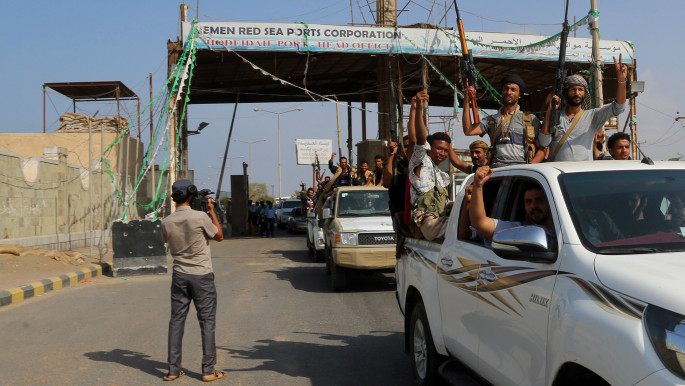Few hopes of reaching peace in Yemen in 2019
Last week the UN approved the deployment of 75 monitors to Hodeida, marking a new development and a deeper engagement in the Yemen war.
These monitors are tasked with overseeing the pull-back of armed fighters of both warring sides from the port city. More specifically, these monitors will be sent to Hodeida city and the ports of Saleef and Ras Issa for a period of six months.
Over the past four years, the UN restricted its role to pushing the parties to the negotiating table or leading peace talks in different venues, including Kuwait and Sweden as well as Sanaa. Two former UN envoys to Yemen resigned from their posts after several failed endeavours to bring Yemen's quagmire to an end.
Now, the UN seems to be taking a different path and adopting another approach. One of these approaches is the recent approval of the 75-strong monitoring team.
 |
Two former UN envoys to Yemen resigned from their posts after several failed endeavours to bring Yemen's quagmire to an end |  |
Relying on the same diplomatic techniques has led the UN nowhere and Yemen remains languishing in war, bloodshed and violence. Accordingly, the ongoing presence of the UN supervisors in Hodeida is synonymous with direct and serious involvement.
Although these UN monitors are said to be unarmed, their presence could set the stage for larger involvement in the future. Before the approval of these 75 monitors, 20 others had already arrived in Hodeida in December, headed by Dutch General Patrick Cammaert. The duty of those 20 monitors was scheduled to end on January 20, 2019.
The UN's magnifying role in Yemen could be a double-edged sword. It could coerce the warring parties to de-escalate, respect the peace talks and forge a solution; this is a positive role. On the other hand, it may continue adopting partial measures to defuse the conflict areas of the country only, and this means the war will persist and the solutions for the deep-rooted political crisis will be unattained.
Prioritising aid delivery or peace progress?
 |
|
| Read also: Houthi handover of Hodeida: A sign of peace or a political manoeuvre? |
Today, Yemen is beset by two major plights: the catastrophic humanitarian conditions and the compounding political divide. The former cannot be eliminated if the latter keeps deepening and exacerbating.
The United Nations has announced that the warring parties in Yemen had agreed to allow aid agencies to reach the Red Sea Mills food warehouses in Hodeida, a move which could help provide enough food to 3.5 million people for a month.
According to UN spokesman Stephane Dujarric, the Netherlands' Cammaert will propose a plan to the Houthis and the government to allow aid convoys to go to the warehouses and pick up the 51,000 metric tonnes of food commodities held there.
The prime concern of the UN is the provision of aid to the people of Yemen. This is not enough. The same level of concern should be given to the political issues. Should Yemen's political crisis receive insufficient attention from the international community, this year will be also bloody, catastrophic and miserable for millions of Yemenis.
Yemen does not solely cry out for food. It is also in dire need of ending the destructive war and raging violence in several parts of the country. The feed-them-and-let-them-fight policy in Yemen needs to be stopped because this will only fan the flames of war.
 |
The feed-them-and-let-them-fight policy in Yemen needs to be stopped because this will only fan the flames of war |  |
New year escalation
The warring sides reached a truce agreement in December after days of talks under the auspices of the UN in Sweden. Hopes were high that 2019 would be better and military operations would slow.
However, the country saw a sharp escalation in the first ten days of this year, casting a shadow over the viability of the entire peace process. A Houthi drone targeted the internationally recognised government-controlled al-Anad airbase to the south of Yemen, killing at least seven - including a senior intelligence officer - during a military parade.
It was a demonstration that the Houthis still have the capacity to fight and their military capabilities continue to be a real threat. Whether they make drones themselves or receive parts and equipment through smuggling from Iran, the attack is a clear-cut indication that the four years of war have not been enough to exhaust the Houthis militarily, despite the huge losses they have sustained.
The Saudi-backed government called the attack a "terrorist act" that reflected "the Houthi pursuit of violence". Reacting to the Houthi drone attack, Yemen's Prime Minister Maeen Abdulmalik tweeted: "Since the first day, the war was the option of the Houthis to face the Yemeni people, and today it is their message to the world. The Al-Anad terrorist act stands for an approach that has never changed."
Following the drone bombing, the head of the UN mission in Hodeida came under fire in the city on Thursday.
"Patrick Cammaert and team are safe in Hodeida following the reported shooting incident," said the spokesperson of the UN chief. It followed a Houthi allegation that Cammaert has deviated from the agreed-upon agenda.
Amid such violent developments at the outset of the year, hope appears faint that the two parties will reach a consensus on peace in the country.
While the peaceful solution is still an option, it is also possible that the government forces will this year attempt vast military advances against the Houthis to dictate a new status quo in post-war Yemen.
The writer is a Yemeni journalist, reporting from Yemen, whose identity we are protecting for their security.
Join the conversation: @The_NewArab





 Follow the Middle East's top stories in English at The New Arab on Google News
Follow the Middle East's top stories in English at The New Arab on Google News


